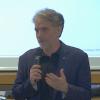Trust can be viewed as an instrument both for an agent selecting the right partners in order to achieve its own goals (the point of view of the trustier), and for an agent of being selected from other potential partners (the point of view of the trustee) in order to establish with them a cooperation/ collaboration and to take advantage from the accumulated trust. In our previous works we focused our main attention on the first point of view. In this paper we will analyze trust as the agents' relational capital. Starting from the classical dependence network (in which needs, goals, abilities and resources are distributed among the agents) with potential partners, we introduce the analysis of what it means for an agent to be trusted and how this condition could be strategically used from it for achieving its own goals, that is, why it represents a form of power. Although there is a big interest in literature about 'social capital' and its powerful effects on the wellbeing of both societies and individuals, often it is not clear enough what is it the object under analysis. Individual trust capital (relational capital) and collective trust capital not only should be disentangled, but their relations are quite complicated and even conflicting. To overcome this gap, we propose a study that first attempts to understand what trust is as capital of individuals. In which sense "trust" is a capital. How this capital is built, managed and saved. In particular, how this capital is the result of the others' beliefs and goals. Then we aim to analytically study the cognitive dynamics of this object.
Being Trusted in a Social Network: Trust as Relational Capital
Tipo Pubblicazione:
Contributo in atti di convegno
Source:
Trust Management, 4th International Conference, iTrust 2006, pp. 19–32, Pisa, Italy, May, 16-19
Date:
2006
Resource Identifier:
http://www.cnr.it/prodotto/i/179043
https://dx.doi.org/10.1007/11755593_3
info:doi:10.1007/11755593_3
urn:isbn:3-540-34295-8
Language:
Eng


